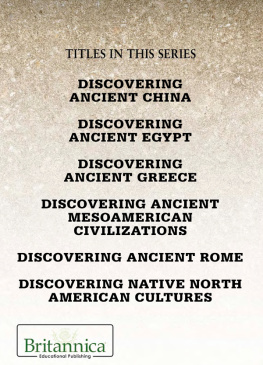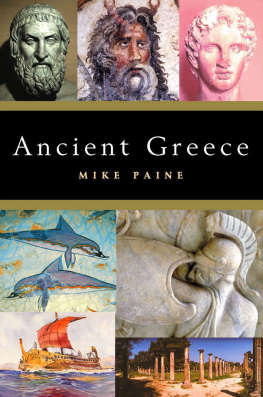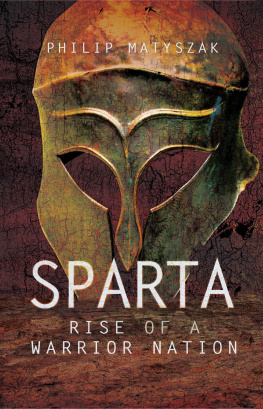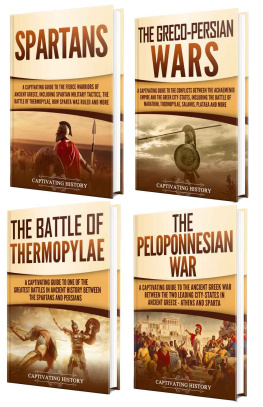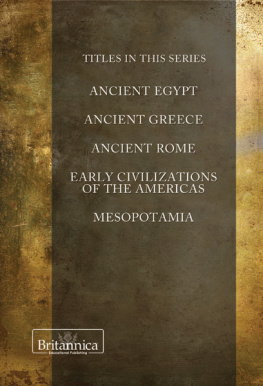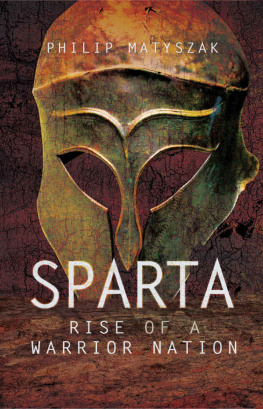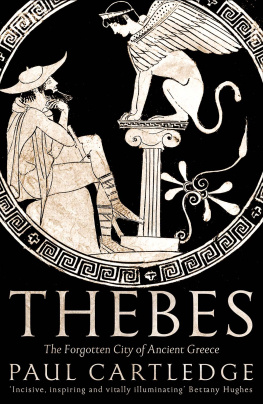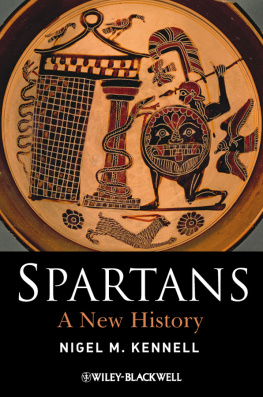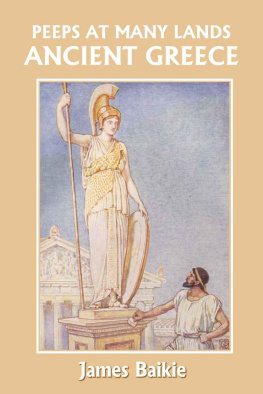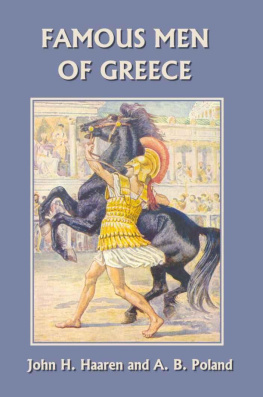Ryan - Sparta: The Warrior State of Ancient Greece
Here you can read online Ryan - Sparta: The Warrior State of Ancient Greece full text of the book (entire story) in english for free. Download pdf and epub, get meaning, cover and reviews about this ebook. year: 2016, genre: Science fiction. Description of the work, (preface) as well as reviews are available. Best literature library LitArk.com created for fans of good reading and offers a wide selection of genres:
Romance novel
Science fiction
Adventure
Detective
Science
History
Home and family
Prose
Art
Politics
Computer
Non-fiction
Religion
Business
Children
Humor
Choose a favorite category and find really read worthwhile books. Enjoy immersion in the world of imagination, feel the emotions of the characters or learn something new for yourself, make an fascinating discovery.

- Book:Sparta: The Warrior State of Ancient Greece
- Author:
- Genre:
- Year:2016
- Rating:3 / 5
- Favourites:Add to favourites
- Your mark:
- 60
- 1
- 2
- 3
- 4
- 5
Sparta: The Warrior State of Ancient Greece: summary, description and annotation
We offer to read an annotation, description, summary or preface (depends on what the author of the book "Sparta: The Warrior State of Ancient Greece" wrote himself). If you haven't found the necessary information about the book — write in the comments, we will try to find it.
Ryan: author's other books
Who wrote Sparta: The Warrior State of Ancient Greece? Find out the surname, the name of the author of the book and a list of all author's works by series.
Sparta: The Warrior State of Ancient Greece — read online for free the complete book (whole text) full work
Below is the text of the book, divided by pages. System saving the place of the last page read, allows you to conveniently read the book "Sparta: The Warrior State of Ancient Greece" online for free, without having to search again every time where you left off. Put a bookmark, and you can go to the page where you finished reading at any time.
Font size:
Interval:
Bookmark:
Sparta
The Warrior State of Ancient Greece
Introduction
In the history of the world, few societies have inspired the interest and admiration that are commanded by the legacy of the Greek city-state of Sparta. A great power in its own time, the martial achievements of Sparta have given it a nearly legendary status in the popular historical perception of the modern era. This state, founded on complete devotion to the society and the exaltation of militaristic virtues, would become one of the dominant forces of ancient Greece, often rivaling the city of Athens in accomplishment and power and participating in some of the greatest military actions of the ancient world.
The history of Sparta is the history of a society not quite like any other the world has ever seen. It is a strange balance of a state that completely dominated the life of the individual, and yet at the same time offered egalitarian freedoms that, in many instances, surpassed those of the more typical Greek states. Sparta is a nearly unique occurrence in the history of the ancient world, in that there is no other society that operated in quite the same manner with which to compare it. It was, at the same time, very much a product of the ancient Greek civilization that had spawned it and greatly different from any of the other states that surrounded it.

By far Sparta's most lasting legacy has come in the form of its military achievements. Even among warrior civilizations, Sparta is unique in having geared nearly the entire efforts of the people within its society toward the support of the military life that was required of each and every Spartan man. Military considerations permeated nearly every aspect of life in ancient Sparta, and the very course of the life of a Spartan citizen was carefully regimented in order to maximize militaristic contributions. This remarkable single-mindedness has resulted in the Spartans coming down to history as perhaps the most famous group of non-legendary warriors that the world has ever known. Even more than 2,000 years after the decline of Sparta, few military traditions have produced soldiers as highly-trained as those of the ancient Spartan military.
Establishing the history of Sparta with any objective certainty is difficult, to say the least. This is largely because the Spartans themselves kept few written historical records. What source material we may turn to, then, is often greatly removed from any kind of primary historical source. Most material that survives regarding Sparta is usually in the form of written documentations of oral traditions (in the manner of Herodotus) or comments on non-surviving historical works by historians of the later Roman era. This work will endeavor to summarize the most likely and agreed-upon elements of the history, society and culture of the ancient city-state of Sparta in a manner that is at the same time informative and accessible to the reader without a large degree of knowledge of ancient Greece. It will address both specific events that occurred within this history, as well as the general characteristics of Spartan civilization that helped to cause these events. It will also attempt to give the reader a solid framework from which to expand into future learning about this most remarkable city-state.
Section One
The Origins of Sparta
Like the majority of the history of classical Greece, the history of Sparta actually begins with the end of another great civilization, that of the Mycenaeans. Mycenaean Greece was a regional power that first arose in around 1600 BCE, and for the next 500 years would dominate the territory that would eventually go on to become Greece. Building upon the advances of the Minoan culture, which had dominated modern-day Greece throughout the period known as the Middle Bronze Age, the Mycenaeans would go on to create a highly organized and powerful civilization. This civilization, though some of its ideas and traditions would be absorbed by the later classical Greek societies, was distinctly different from them.
There is a purported history of Sparta in Mycenaean times, as set forward by Homer is his work The Iliad . According to this ancient epic poem, Sparta was already a thriving center of ancient Greece during the Mycenaean period of its history. Its king, Menelaus, is portrayed in the poem as the husband of Helen of Troy and the brother of Agamemnon, the ruler of the Mycenaeans. Recent archaeological finding have suggested that there was a Mycenaean center of power in Laconia (the region surrounding Sparta) during this time period which may have served as the inspiration for Homer's Sparta. Whether this is true or not, it is important at this point to differentiate Homeric Sparta from the Sparta of better-established Classical Greek history. Because the Spartans themselves were Dorians (see information of Dorian Invasion below), it is almost certain that the Spartans of later Greek history were an ethnic group that moved into the Peloponnese after the Mycenaean collapse. While the non-citizens and slaves living under Spartan rule in Laconia may have been descended from the Spartans described by Homer, there is little doubt that neither the classical city-state nor its dominant population existed in Laconia during this earlier era of Greek history.
Much like other civilizations in the Mediterranean region at the time, the Mycenaean civilization would decline with the massive event known as the Late Bronze Age Collapse in the 12 th century BCE. There are many competing theories as to the exact cause of the collapse of the Mycenaean civilization, though there is much reason to believe that, like the other societies that were ultimately destroyed by it, the collapse in Greece was probably caused at least in part by a group known as the Sea Peoples. This enigmatic group, though it seems to have affected and indeed disrupted the entire power structure of the ancient world at the time, has never been satisfactorily identified. What is known, however, is that the Sea Peoples, whoever they may have been, contributed heavily to the downfalls of both the Hittite empire and the ancient kingdom of Egypt, among other civilizations in the region at the time. Because the Mycenaean Greeks were geographically close to these regions where raids by the Sea Peoples were common, there is every reason to think that they would have been affected by them as well.
Another idea that has been put forth as the cause of the Mycenaean collapse separates it from the collapses of other Late Bronze Age civilizations around the same time. This theory links the collapse of the Mycenaeans to a hypothesized event known as the Dorian Invasion. This event, based upon a myth of the ancient Greeks that detailed the taking of the Peloponnese Peninsula by an ethnic group known as the Dorians, has been used as a possible explanation for the sudden appearance and spread of a culture identifiable as the forerunner of that of the Dorian city-states of Greece in the classical era, as contrasted with earlier Mycenaean culture. This so-called invasion, however, was more likely a spread of a set of cultural ideas and a migration of peoples from within Greece itself than the result of an actual incursion from outside forces.
Along with Dorian culture came the Dorian, sometimes called Doric, dialect of ancient Greek. This was a distinguishable dialect of the Greek language that appears to have come into widespread use as the Dorian culture spread across certain parts of Greece, particularly the Peloponnese. This dialect replacement has been used as validating evidence for the theory of the Dorian Invasion, but it does not definitively prove that any sort of general invasion took place, only that the customs, language and culture of the Dorian Greeks were spreading across the peninsula at the time. The same phenomenon could easily have been accounted for by a migration of Dorians from their presumed homelands in northwestern Greece into the Peloponnesian region. Thus, the exact manner of the coming of the Dorians and what role they played in the downfall of the Mycenaeans remains an open question.
Next pageFont size:
Interval:
Bookmark:
Similar books «Sparta: The Warrior State of Ancient Greece»
Look at similar books to Sparta: The Warrior State of Ancient Greece. We have selected literature similar in name and meaning in the hope of providing readers with more options to find new, interesting, not yet read works.
Discussion, reviews of the book Sparta: The Warrior State of Ancient Greece and just readers' own opinions. Leave your comments, write what you think about the work, its meaning or the main characters. Specify what exactly you liked and what you didn't like, and why you think so.







